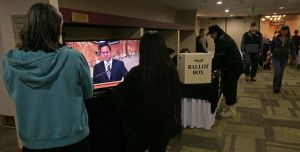By Sari Horwitz, The Washington Post
The 2013 reauthorization of the Violence Against Women Act was heralded by President Barack Obama as a significant step for Native American women because it allows tribal courts to prosecute certain crimes of domestic violence committed by non-Native Americans and enforce civil protection orders against them.
Before the bill passed the Senate, however, Sen. Lisa Murkowski, R-Alaska, added Section 910, known as the “Alaska exception,” that exempted Alaska Native tribes. Murkowski argued that her provision did not change the impact of the bill since even without it, the bill pertained only to “Indian country,” where tribes live on reservations and have their own court systems. As defined by federal law, there is almost no Indian country in Alaska.
Now, after pressure from Alaska Natives, Murkowski is reversing her position and trying to repeal the provision she inserted.
The senator’s change of mind is the subject of much debate in Alaska, with state officials saying that ending the exception won’t make any difference for Alaska Natives because it only applies to Indian country and the state already takes action to protect Native women and children. Tribes and the Justice Department, on the other hand, argue that repealing the provision will have a significant impact.
Associate Attorney General Tony West, who called for the repeal of the “Alaska exemption,” says that the state needs to enforce tribal civil protection orders in cases of domestic violence and that the legislative change would send a strong message about tribal authority.
“It’s important to send a very clear signal that tribal authority means something, that tribal authority is an important component to helping to protect Native women and Native children from violence,” said West, who testified in June before a hearing in Anchorage of the Task Force on American Indian and Alaska Native Children Exposed to Violence. “Those civil protective orders can help to save lives.”
Murkowski’s provision, which was originally an amendment she co-sponsored with Sen. Mark Begich, D-Alaska, in 2012, was supported by state officials. Begich has also changed his position since then.
Alaska Attorney General Michael Geraghty and Gary Folger, commissioner of the Department of Public Safety, have said that Alaska is already enforcing civil protection orders issued by tribes to try to keep one person from stalking or committing abuse or violence against another person.
But Murkowski’s “Alaska exception” reopened a contentious debate surrounding criminal jurisdiction over Alaska Native villages, and it has created confusion among law enforcement officials.
Alaska Native women protested Murkowski’s exception, and the Indian Law and Order Commission called it “unconscionable.”
“Given that domestic violence and sexual assault may be a more severe public safety problem in Alaska Native communities than in any other tribal communities in the United States, this provision adds insult to injury,” the commission said.
“We went to villages where every woman told us they had been raped,” Eid said. “Every single woman.”
On her Facebook page last year, Murkowski wrote: “It hurts my heart that some Alaskans may think I do not fully support protecting Native women from violence with every fiber of my being.”
“In Alaska, we have one, and only one reservation: Metlakatla,” Murkowski wrote. “The other 228 tribes have been described by the U.S. Supreme Court as ‘tribes without territorial reach.’ The expansion of jurisdiction over non-members of a tribe is a controversial issue in our state, and what works in the Lower 48, won’t necessarily work here.”
Murkowski said she still has concerns about repealing the exemption but said in a statement: “We must turn the tide of the rates of sexual assault, domestic violence, and child abuse in our state.”





